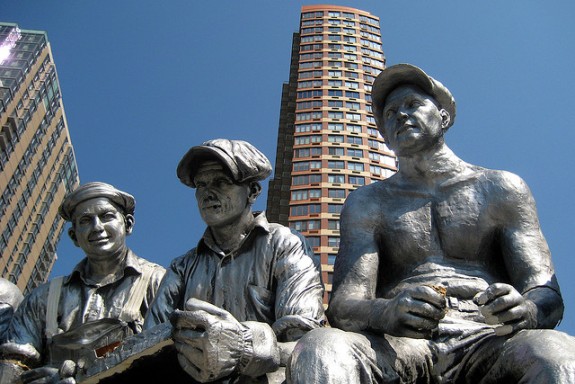This Labor Day, we reflect on the many contributions workers make to the U.S.—including those of immigrant workers. While immigration restrictionists have long tried to demonize immigrant workers and blame them for high unemployment rates and other economic woes, the facts make it clear that immigrants actually create jobs and businesses and boost the wages of native-born workers. Research shows time and time again that immigration levels are positively correlated with economic output and growth.
According to the Fiscal Policy Institute, economic growth of the top 25 metropolitan areas and growth in the immigrant share of the workforce are closely connected. In the period studied, from 1990 to 2006, Phoenix, Dallas, and Houston saw the fastest growth in immigrant share of the labor force and had well above-average economic growth. The three metropolitan areas with the slowest economic growth—Cleveland, Pittsburgh, and Detroit—had among the smallest increases in immigrant share of the labor force.
Immigrants add to the economy in a number of ways:
- They increase the overall number of workers, which makes the economy larger and increases gross domestic product (GDP).
- They complement the U.S. workforce which today is older and more educated than ever before. Immigrant workers tend to be concentrated at the top and the bottom of the educational scale, while most Americans fall somewhere in the middle. In other words, immigrants and native-born workers have different levels of education, work in different occupations, and live in different areas of the country.
- Immigrant workers spend their wages in U.S. businesses—buying food, clothes, appliances, cars, etc.—which sustains the jobs of the workers employed by those businesses. Moreover, businesses respond to the presence of new workers and consumers by investing in new restaurants, stores, and production facilities. The end result is more jobs for more workers
- Finally, immigrants are entrepreneurial and more likely than natives to start their own businesses. According to a report from the Kauffman Foundation, “immigrants were more than twice as likely to start businesses each month than were the native-born in 2010.”
Contrary to what many Americans believe, there is no evidence that immigrants work and contribute at the expense of wages for native workers. In fact, a February 2010 report from the Economic Policy Institute (EPI) finds that the “effect of immigration from 1994 to 2007 was to raise the wages of U.S.-born workers, relative to foreign-born workers, by 0.4% (or $3.68 per week).” Even the small (and shrinking) number of “U.S.-born workers with less than a high school education saw a relative 0.3% increase in wages (or $1.58 per week)” as a result of immigration during this period.
This isn’t to say that the current system functions perfectly—far from it. The employment-based immigration system created in 1990 hasn’t been updated for 21 years, and the antiquated and burdensome laws and regulations make it difficult for foreign workers to immigrate to the U.S. There is evidence that more and more highly-skilled immigrant workers and entrepreneurs have decided to take their investments and skills to other countries that offer more attractive incentives.
This Labor Day, it’s important to think about how immigrants have and continue to contribute to our economy, but also about how our immigration system needs to change if America is to remain competitive in the global economy in the long run.
Photo by wallyg.



